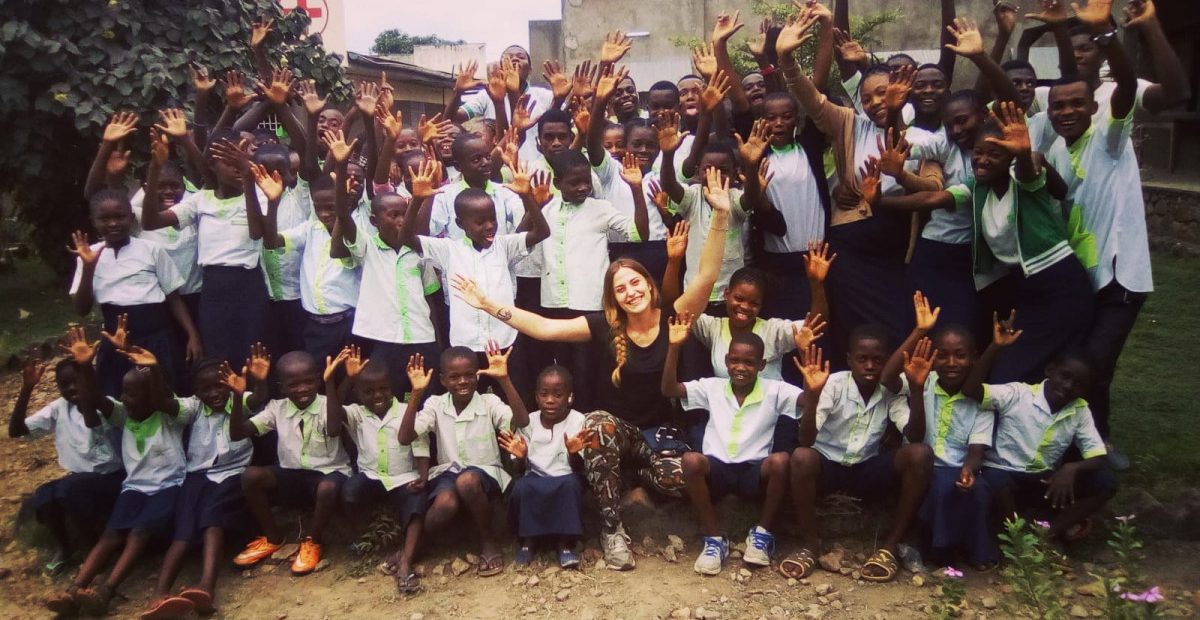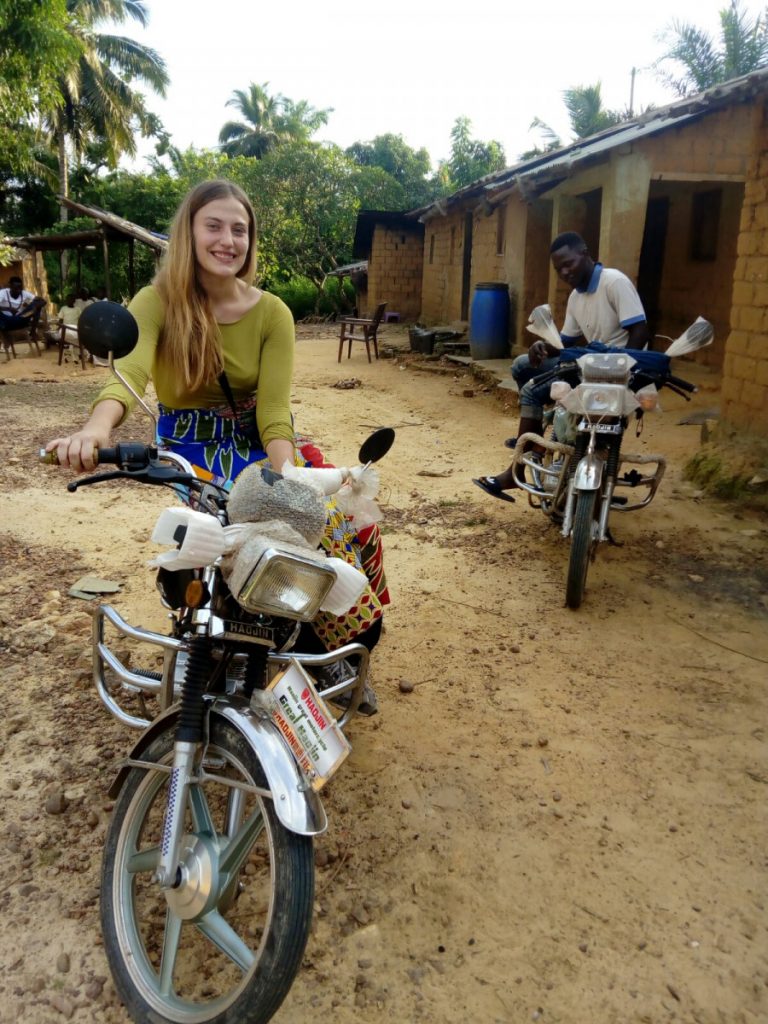
Workshop
Congo Malaise

This is the story of Sara, a young speech therapist from Italy who, after graduation, travelled to Congo to work in a specialised centre for deaf children. Her aim was to give, instead…
I have been working all summer to make my dream come true: to spend a month in the Democratic Republic of Congo (DRC), in the city of Boma, at a specialized center for deaf children called “Florentia Institute“. I got my degree in speech therapy at the University of Florence, Italy, just a week before leaving. The Center, with its classrooms, surgery, and laboratories, had been set up by my professor, through the “Deafness has no color” Association, to improve the living conditions of deaf children in those areas. He had discouraged me from going down there: “Sara, you can go, if you feel like…” – he told me – “but I cannot guarantee that you will be able to do something!”
In short, I left because I really wanted to go, at my own expense, against his pessimism and the hammering news that advised not to go there.
I landed with a very romantic idea of Africa: the savannah, the small villages … And, I am not naive, I even imagined poverty. Kinshasa, the capital city of the DRC, is a metropolis, or rather a boundless shantytown, more like a favela: houses made of sheet metal, containers, and wood. A huge expanse of all this. Then, you see the houses of the rich, the big villas. What a contrast! Outside temperature reaches 42° C and the air saturated with humidity.
After a few days in Kinshasa, I reached Boma aboard a jeep, along with Msgr. Jean Basile, the person in charge of the Florentia Institute: ten hours to travel 300 kilometers! I had an intense exchange with him in the previous months, to plan the journey and the work that I would have done at the Center.
In Boma, the Center hosts ninety-five deaf children and teens. Only 3% of them were born deaf, the others have become deaf because of simple inflammations, perforated and neglected eardrums, meningitis, or wrong doses of drugs, such as quinine prescribed for malaria, which are often administered in absurdly huge doses.
The Center was located in the poorest area of Boma. I lived with the nuns, in an ordinary house. I had a simple room, without power supply and running water. The toilet was just a hole, and we used rainwater to wash ourselves. I received a very warm welcome, they introduced me all the teachers and the staff of the medical center: all of them were Congolese, I was the only mundele, i.e. the only white person in town.
Living with them, I found out that the ninety-five children of the Center attended a regular program at school but all in sign language, without any attempt to integrate them, by teaching them to speak. I also found out that deaf people, in the local culture, are considered “trash”, stuff to throw away, like all other people with disabilities, because they are a burden for the family, simply because they are not productive. For some, they are the children of the devil, so they are to be marginalized.
Part of my work took place in the laryngologist otorhin’s surgery. We performed audiometric tests, we inserted the prostheses sent over by my professor, and we trained the few parents who were ready to fight against the stigma. Every day, we gave a one-hour class of voice articulation and logocromy, focusing on the awareness of one’s own voice. We started with the vowels and, at the end of the month, every child was able to pronounce his or her name and to say, “Bonjour,” “Merci,” “Comment ça va?” (Good morning; thank-you; and, how are you?). They made me so happy!
My work ended at 2.30 pm, the rest of the day I had freetime. The first few days the nuns insisted that I had to remain in the convent, for my safety, but I soon reacted, and I began to explore the neighborhood.
Outside the Center, I saw that the families lived in arranged huts and they had meals in shifts. Every day the mother selected the children who were to receive food: today just two of them, tomorrow another two, and so on. I learned that in that place children used to die like flies, even for an untreated cold. Because of what I found out, I began to rise anger, for injustice, for that passive mentality that delegates everything to God, “if God wants, tonight I will eat”; “if God wants, my child will survive this disease.” In the DRC, I saw an absent State, all rights denied, and I doubted the God in whom I always believed.

After a month, it was time to leave. I withdrew all the money I had on my bank account and I bought 50 kilograms of rice, 50 kilograms of beans, and several bunches of bananas and I distributed the food among all the poor families in the neighborhood. As we were almost over with this distribution, I heard someone crying very loud and I saw a mother with a little child in her arms, very pale because of pain, her eyes turned upside down. Her daughter had been treated in the hospital but she had been given medicines that did not work. As she had no money to buy other medicines, she returned home, waiting for the little girl to die in her arms. I just could not stand it! I took her immediately back to the hospital. But I had no money, I did not know how to pay … Suddenly, I found a twenty-euro bill in my bag. I was afraid it would not be sufficent, but I hoped it would at least be enough as a guarantee. In the end, the total cost of treatment was exactly 19 euros and fifty cents. Thanks to that money, today Mercis is alive. When her mother met me again, she said, “I prayed so much for you to come again!” And, perhaps, it was true. God uses us.
This is how, in Congo, I experienced a very strong, powerful, deflagrating love, a love that makes you happy, like never before, thanks to children.
One afternoon, while I was going back from work, it was so hot that I was about to faint. On the road, a naked barefoot girl with a banana in her hand approached me. She offered it to me, and she insisted that I ate it. Very likely, it was her only meal of the day, but she gave it to me. I felt so much loved! An overwhelming, engaging love that leaves you the desire to live that same experience again and again…
Mama Eve works at the school of the Florentia Institute and she hosts five abandoned deaf teens in her house. When I shared that experience she told me, “You see, what you feel now is love, it is God, it is what you were desperately looking for.”
People say that Africa changes you. I say that it pierces you, it upsets you, it destroys you, and it fills you up with love.



